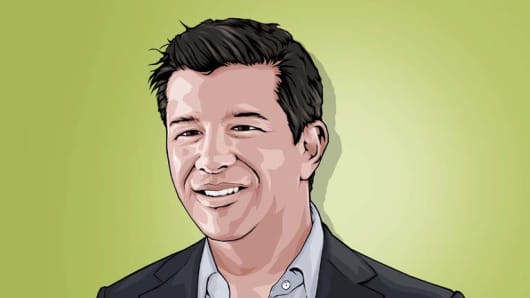CNBC.com Staff
 If Uber founder and CEO Travis Kalanick has his way, Rolls-Royce models may be picking up passengers in Peorias across the world, even on the Siberian tundra.
If Uber founder and CEO Travis Kalanick has his way, Rolls-Royce models may be picking up passengers in Peorias across the world, even on the Siberian tundra. It's been a long, strange trip for Kalanick's runaway success with Uber—now valued at $17 billion—and it wasn't a smooth trip, either.
"The last company I did was crazy stressful, because I had no money and was always trying to make it work and got a hundred 'no's' a day for six years straight, which is hundreds of thousands of 'no's,'" Kalanick told CNBC.
"We will find out how small we can go, and as long as we can get the price low, we may be able to get to communities of 20,000 to 30,000 people."
Uber is "a different kind of stress," Kalanick said—a stress caused by
success that has attracted a ton of controversy, from regulatory scrutiny across the globe to striking taxi drivers and bitter spats in the press with rivals including Lyft.
"Any successful business will have clones," Kalanick said, adding, "Clones keep you honest and competitive."
Read MoreWho made the CNBC Next List?
The controversy and competition may soon extend well beyond the major metro areas, where Uber has found its early success.
"We are still in the process of finding out how small a community Uber will work in," Kalanick said. "We've gone to cities as small as 90,000 people, and Uber does great. As we're moving out to smaller and smaller places, we will find out how small we can go, and as long as we can get the price low, we may be able to get to communities of 20,000 to 30,000 people," he explained.
success that has attracted a ton of controversy, from regulatory scrutiny across the globe to striking taxi drivers and bitter spats in the press with rivals including Lyft.
"Any successful business will have clones," Kalanick said, adding, "Clones keep you honest and competitive."
Read MoreWho made the CNBC Next List?
The controversy and competition may soon extend well beyond the major metro areas, where Uber has found its early success.
"We are still in the process of finding out how small a community Uber will work in," Kalanick said. "We've gone to cities as small as 90,000 people, and Uber does great. As we're moving out to smaller and smaller places, we will find out how small we can go, and as long as we can get the price low, we may be able to get to communities of 20,000 to 30,000 people," he explained.

No comments:
Post a Comment